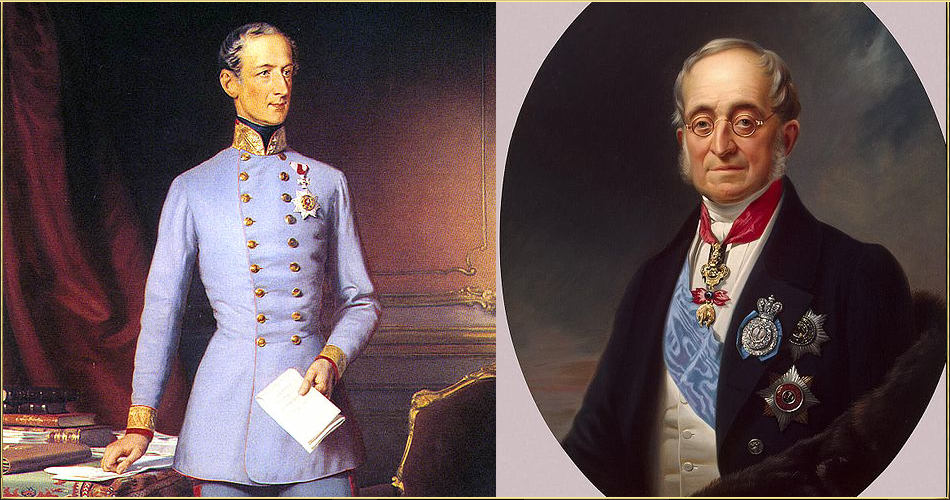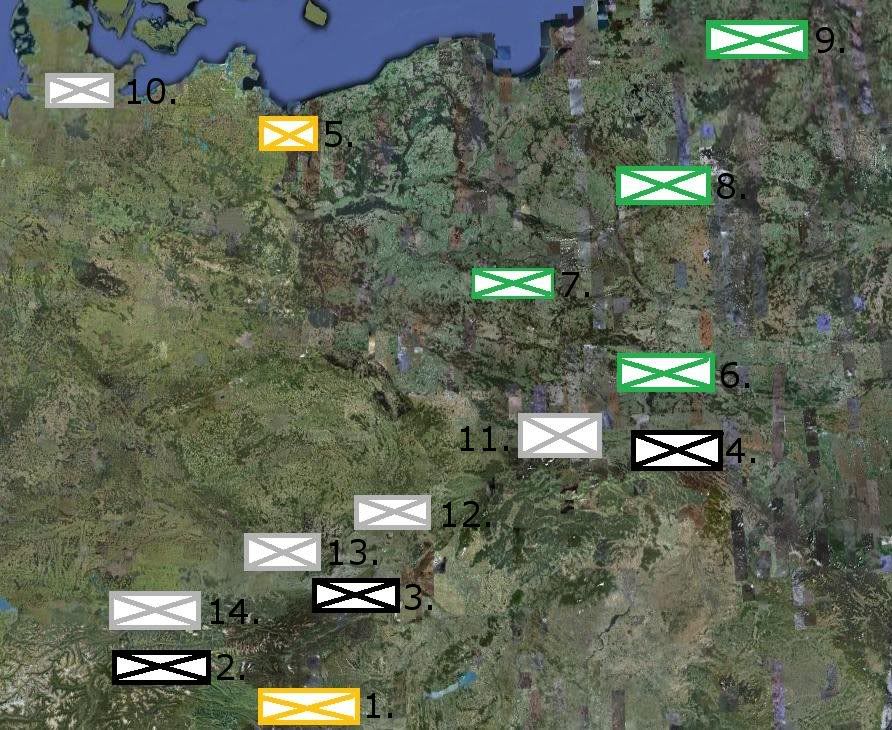To All: Should have an update out this weekend, be it Friday, Saturady or Sunday.
Ahura Mazda: I could think of worse places to fight battles, but the terrain is not to the attacker's advantage, and it is only through sheer numbers that I have done what I have so far.
Enewald: Have you considered what reserves Austria has though? Covering this more in the next update.
Hardraade: An old military idiom states that 'no plan ever makes it past first contact with the enemy' and this is precisely the problem here. I cannot expect my plans to have gone to the letter, and the changes are not all that distressing. It hardly takes a genius to work out how to shore up the line.
Eöl: Not the Venetians, no. Still considering Piedmontese claims, though. Will cover my thoughts on Italy and Unification in a few updates time.
Kampf_Machen, Tommy4ever: Anschluss would be my own goal, but we'll see what Berlin has in mind.
demokratickid: This is not China, and I do not have an inexhaustable supply of men to throw at the Alps. Then again, 680,000 should be enough. But phargle has a most valid point.
Mishgan: Hold your horses, next update will partially cover the events in Galicia, so you'll just have to wait. Nice to have you back again
volksmarschall: Austria is facing, more or less, the same problems that it did in the Seven Weeks War. They are outgunned and outnumbered, but they are not making the mistake of taking their outdated army into a major head-on confrontation... yet.
phargle: What I have not covered in any detail, and of which I regret now, is the Prussian occupation and control over their areas of Czechoslovakia since the first wars with Austria. The bare fact is, the Czechs do not trust the Germans anymore than the Austrians. At least they are treated as, almost, first-class citizens by the Austrians who could not bear to have the Czechs leave the Empire with their advanced industry. Indeed they have reason to be disgruntled by Austria, but as yet they have no reason to love the Germans. More on that later on.
Also, I think you have made an excellent point that the call-up of over half-a-million troops is not going to have gone unnoticed in the courts of Europe. More on this soon as well.
comagoosie: They are fighting a most effective delaying action, and I am annoyed, because time is running out for me to hit Austria before they are ready to bounce back at me. You'll see why soon enough.
Rensslaer: Deeply honoured to have you back, sir, most honoured. Thought we'ed lost you long back. Think of my tactics like this; I'm British. I have this ingrained British view of warfare that you do the utmost you can with purely the Regular Army and then only when it is really needed do you call up the reserves and damage the economy. Of course, this doesn't work quite so well for central Europe as it does for a Island nation. But so far it hasn't failed me. It is beginning to bog down now, though. And something big is coming right over a hill.
Ahura Mazda: I could think of worse places to fight battles, but the terrain is not to the attacker's advantage, and it is only through sheer numbers that I have done what I have so far.
Enewald: Have you considered what reserves Austria has though? Covering this more in the next update.
Hardraade: An old military idiom states that 'no plan ever makes it past first contact with the enemy' and this is precisely the problem here. I cannot expect my plans to have gone to the letter, and the changes are not all that distressing. It hardly takes a genius to work out how to shore up the line.
Eöl: Not the Venetians, no. Still considering Piedmontese claims, though. Will cover my thoughts on Italy and Unification in a few updates time.
Kampf_Machen, Tommy4ever: Anschluss would be my own goal, but we'll see what Berlin has in mind.
demokratickid: This is not China, and I do not have an inexhaustable supply of men to throw at the Alps. Then again, 680,000 should be enough. But phargle has a most valid point.
Mishgan: Hold your horses, next update will partially cover the events in Galicia, so you'll just have to wait. Nice to have you back again
volksmarschall: Austria is facing, more or less, the same problems that it did in the Seven Weeks War. They are outgunned and outnumbered, but they are not making the mistake of taking their outdated army into a major head-on confrontation... yet.
phargle: What I have not covered in any detail, and of which I regret now, is the Prussian occupation and control over their areas of Czechoslovakia since the first wars with Austria. The bare fact is, the Czechs do not trust the Germans anymore than the Austrians. At least they are treated as, almost, first-class citizens by the Austrians who could not bear to have the Czechs leave the Empire with their advanced industry. Indeed they have reason to be disgruntled by Austria, but as yet they have no reason to love the Germans. More on that later on.
Also, I think you have made an excellent point that the call-up of over half-a-million troops is not going to have gone unnoticed in the courts of Europe. More on this soon as well.
comagoosie: They are fighting a most effective delaying action, and I am annoyed, because time is running out for me to hit Austria before they are ready to bounce back at me. You'll see why soon enough.
Rensslaer: Deeply honoured to have you back, sir, most honoured. Thought we'ed lost you long back. Think of my tactics like this; I'm British. I have this ingrained British view of warfare that you do the utmost you can with purely the Regular Army and then only when it is really needed do you call up the reserves and damage the economy. Of course, this doesn't work quite so well for central Europe as it does for a Island nation. But so far it hasn't failed me. It is beginning to bog down now, though. And something big is coming right over a hill.



